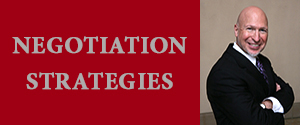

Dear Clients and Friends,
Why should prospects hire you over your competitors?
Below is an article in which I apply sophisticated negotiation techniques to persuasion and influence in the sales context.
Should you have an interest in tools for resolving disputes, listen here to a podcast in which I am interviewed about my favorite dispute resolution tools.
If you prefer videos, please visit our newly launched YouTube channel and subscribe. This channel provides exclusively informative and instructional content relating to negotiation, communication and dispute resolution.
Whether through the written word, audio podcasts or visual videos, I look most forward to further engagement with you!
With Best Wishes,
Raphael
The Differentiation Dilemma
In sales, one of the more intimidating but inescapable aspects of business is meeting with prospective clients and trying to obtain new accounts. We are not taught how to do this effectively in school nor do we deliberately go out and seek training or coaching to improve our skills (although that would be money well invested). We attempt an ad-hoc approach without a road map and process which results in unpredictable and hit-or-miss outcomes.
One of the more threatening situations that we often encounter is what I call the “differentiation dilemma,” and in this column, I will equip you with an approach and process to respond to this potentially perilous encounter with a greater rate of success.
While attempting to win over a new client, we may think that we are impressing them with our knowledge and acumen. All seems to be perfectly aligned as we begin to feel quite proud of our salesmanship and performance. However, that euphoric feeling can be rather abruptly shattered when the prospective client says: “So, tell me why I should hire you over the other hundred vendors who called my office last week?”
Read More —>
One of the more threatening situations that we often encounter is what I call the “differentiation dilemma,” and in this column, I will equip you with an approach and process to respond to this potentially perilous encounter with a greater rate of success.
While attempting to win over a new client, we may think that we are impressing them with our knowledge and acumen. All seems to be perfectly aligned as we begin to feel quite proud of our salesmanship and performance. However, that euphoric feeling can be rather abruptly shattered when the prospective client says: “So, tell me why I should hire you over the other hundred vendors who called my office last week?”
Read More —>


